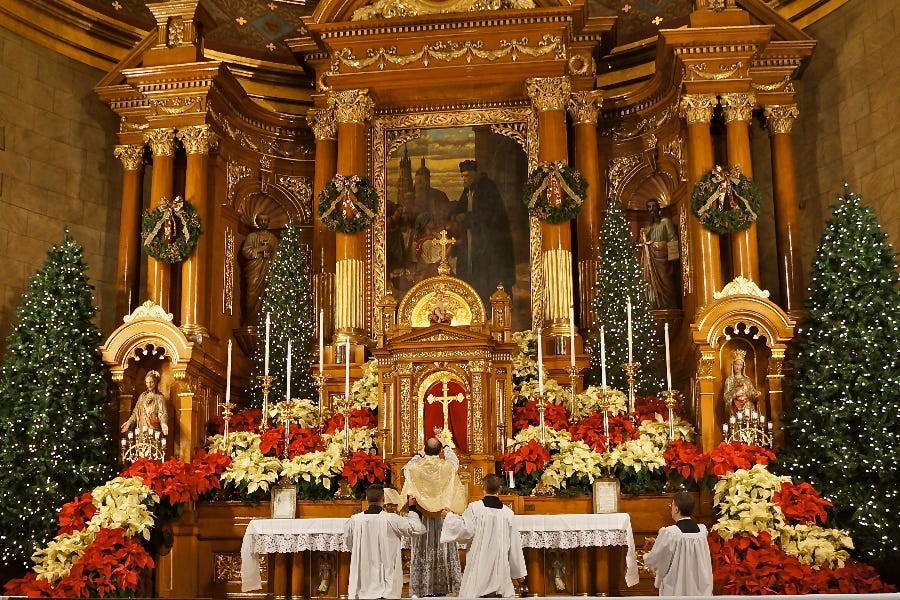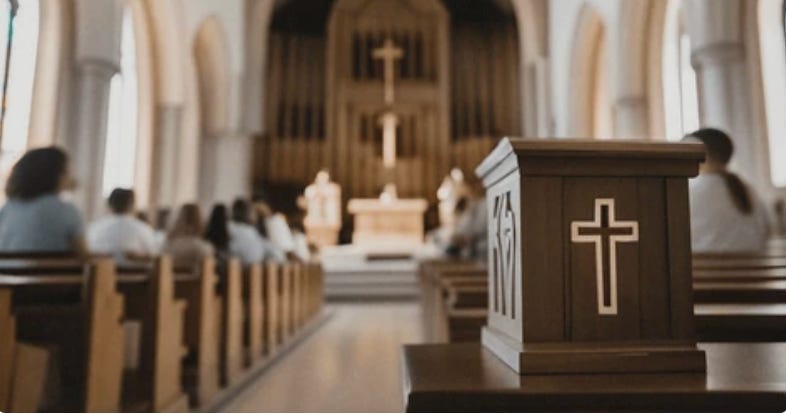Hey everybody,
There are five days until the first Sunday of Advent, and this is The Tuesday Pillar Post.
If you are an American, you know we are in full countdown mode: There are only two days until Thanksgiving.
If you’re not an American, well, it is still true that there are only two days until Thanksgiving — the Canadian notion that Thanksgiving can be celebrated in October is entirely implausible.
With that said, some Newfoundlanders eat corned beef and cabbage on “Canadian” “Thanksgiving,” and that happy fact just might redeem the entire country’s celebration.
I’ll write more about Thanksgiving, including an extraordinary grace for my family this year, after the news.
The news
When the U.S. bishops’ conference decided to draft a document addressing “Eucharistic coherence,” it fell to Bishop Kevin Rhoades to actually make that happen.
With the project now finished, Rhoades sat down with The Pillar for a lengthy conversation about the document, the process that made it happen, and lessons for the USCCB.
The Eucharist gets to the very heart of our faith, our redemption. The document brings that forth.
God’s love is revealed in Christ, and seen most vividly in the crucifixion. And that’s why the emphasis on the Eucharist as sacrifice is really important — because we’re talking about this amazing gift of self-giving love by the Son of God, made man.
So the incarnation, our redemption — all of that is in the document. I mean, it gets to the fundamentals of our faith, and our need for redemption.
The Eucharist makes present that great act of divine love. I think a revival of the faith, through a Eucharistic revival, is a great need, and I think that’s why there is a lot of excitement about the Eucharistic revival.
Whatever you think of the bishops’ document, Rhoades is the guy at the center of its creation — he takes a deep-dive with The Pillar that you should read.
When the USCCB met last week, the meeting included more “executive sessions,” — closed-door meetings of bishops — than are usually scheduled.
Of course, journalists (including me) groused, grumped, and complained a bit about being excused from the room before some business was conducted.
So after the meeting, I wondered, will more closed-door meetings become the ordinary way of doing business for the USCCB? If so, is that a good idea? It is transparent?
The Pillar asked bishops this weekend what they think about turning the tv cameras off for some of the USCCB’s deliberations. Here’s our reporting.
Bishop Richard Umbers, an auxiliary in Sydney, Australia, thinks about heading to the pool or the beach when he hears the Christmastime readings, and lights the Advent candles.
Christmas in Australia is in the middle of the summer. The feast “is almost always hot, and the clergy will certainly feel the heat in their vestments,” Umbers told The Pillar.
Freelance journalist and Wisconsin priest Fr. Victor Feltes reported this week on Catholics living and preaching the liturgical calendar in the Southern Hemisphere, where every feast comes at a different season than we in the Northern Hemisphere expect, with different symbols, customs, and catechetical opportunities.
One priest stationed in the Falkland Islands talked about celebrating Christmas at the summer solstice:
“In symbolic terms, I think of the long days as a sign of the victory of the light of Christ: ‘The light shines in the darkness, and the darkness has not overcome it’.”
And about the mid-winter Feast of Corpus Christi:
“I preach on devotion to the Sacred Heart in June…In the winter when we feel chilled, the Heart of Christ is the 'burning furnace of charity,' as the Litany says.
The Church is universal, but all feasts are local. Read this cool story here.
And now for something completely different
There’s a pretty good chance that wherever you go for Thanksgiving on Thursday, someone will turn on a football game — the gridiron is a big part of Thanksgiving Day for a lot of families.
Well, before the games get started, we’d like to bring you some predictions. We don’t know that much about the players, their records, or the merits of the power run game and the four WR set.
But we do know about saints. To get ready for some football, we are pleased to bring you The Pillar’s Patron Saint Thanksgiving Showdowns.™
Will St. Corbinian’s Chicago Bears roar past St. Leo the Great’s Detroit Lions?
Will The Gaucho Priest and the Dallas Cowboys lasso St. Patrick and the Las Vegas Raiders?
Can the Maid of Orleans help beat the Buffalo Bills and a Hometown Hero?
Let’s face it, readers: hagiography might be an imperfect way of calling football games, but it’s a lot more interesting than reading about the NFL.
Thanksgiving notes
Here’s a couple notes about Thanksgiving. Thanks for indulging them:
—The first time I remember watching the Macy’s Thanksgiving Day parade, I was seven or eight years old.
While my mom cooked a turkey and my cousins slept in leaky air mattresses on the living room floor, my dad and I watched the parade on a wooden cabinet television that got only six channels, and had been in our house longer than we had.
My dad explained to me that at the end of the parade, the last float would be Santa Claus.
I didn’t yet understand that the parade was principally a commercial affair — that its main purpose was to remind viewers that the Christmas shopping season was upon us, and that Macy’s was the place to be. I didn’t realize Santa Claus was the product placement at the center of the whole thing. And I guess I hadn’t yet seen “Miracle on 34th Street.”
So when my dad told me Santa was the parade’s caboose, I pushed back. I told my father that seemed unlikely, since it wasn’t quite Advent yet, and besides, this was a Thanksgiving parade, not some kind of tree-lighting ceremony.
My father had watched the parade on television since he was a child. He knew about Kris Kringle, and the parade, and Macy’s and Gimbel’s, and Doris and Fred and Susan. My dad had been to the damn parade.
And still, that morning he had to contend with a seven-year-old, full of bravado and logic, insisting that he knew the facts.
I now realize that it might have been, from time-to-time, exasperating to be my father.
See, it wasn’t just the parade. My dad gamefully endured, encouraged even, his bookish and precocious son to offer him a pippy little string of “well, actually-s” about whatever fact I happened to have recently read about.
Sometimes, as with Thanksgiving, I proffered the “well, actually” when I hadn’t actually done the reading.
On that Thanksgiving, my dad decided it was time to teach me a little lesson about humility. Maybe “well, actually” had just gotten to his last nerve. Or maybe he just wanted my money.
My dad offered a wager about Santa Claus. I was so confident that I set the sum at an amount so vast I couldn’t even really conceive it: 50 dollars. My dad let me place the bet, but he told me that if I lost, he wouldn’t take it easy on me. I’d have to pay.
Of course, Santa Claus came around at the end of the parade. And of course, I didn’t have $50. In fact it took me a few years before I could pay my debt — when I was around 13, as soon as I collected my very first paycheck from my very first job, my dad piped up to remind me about the $50. He said he was generous enough not to charge me interest.
Though I’ve made good on the bet, my entire family reminds me each year about the whole affair. In fact, sometime this Thanksgiving morning, I know I’ll get a call from my dad.
“JD, man, do me a favor. Turn on the parade. Have you got it on? Ok, pal, listen, tell me who that guy is in the red suit.”
I’m pretty thankful that he’ll call.
—
My daughter Pia Therese is eight years old. Pia is smart, funny, stubborn, and fiercely independent. Some readers of The Pillar know that Pia has Down syndrome — this means a lot of things, but one is that Pia has an outsized sense of her ability to independently navigate to the places she’d like to go.
On Sunday after Mass, Pia tends to run to the church basement for lemonade and donuts faster than we can keep up with her. Usually, we’re down just a half-minute or so after she is, and we find her happily chatting with the kindly Knight of Columbus handing out crullers and Boston Cremes.
But this Sunday as Pia headed down the stairs, a fellow parishioner stopped me in my tracks to discuss something, while my wife Kate was busy helping the other kids get ready to leave church. It was a few minutes before either of us got down there.
Pia was nowhere to be seen. A few families mentioned that they had seen her, but no one quite knew where she was. I checked outside while Kate checked the whole church basement. Then Kate checked the stairwells while I checked the pews in church.
No Pia.
The boys were fussing for lemonade, but Pia was missing. A few other parents and one of our priests helped us look around — in the confessionals, in the bathrooms, in the parking lot.
No Pia.
After 20 minutes, we had about 10 people searching with us. I decided to call the police. An officer showed up, he took a report, he asked for a photo, and then asked to review the parish’s security cameras. While he watched the tape, more families fanned out over the parish campus, calling her name.
No Pia.
The police officer called for backup. Soon there were three squad cars at the parish and in the neighborhood, then four, then five. Word spread among parishioners and among our friends; families were walking the neighborhoods, the parks and trails abutting the parish, the railroad tracks behind the baseball field, the small homeless encampment abutting the tracks.
No Pia.
A half hour into the search we were pretty nervous. An hour into the search, and I was imagining the worst. Readers, you know the kinds of things I research and write about, so you can presume that my capacity to imagine the worst gets pretty dark.
Kate exemplified a kind of strength — poise and composure — that taught me again how blessed I am to have her as a wife, and how blessed my children are to have her for their mother. We reminded one another that everything would be fine, that ‘God is in control,’ that the boys thought Pia was playing hide-and-seek, and there wasn’t any need to panic them.
But when I heard and then saw a police helicopter, it wasn’t easy to keep it together. I told one of our parish priests — wonderful men from a wonderful religious community — that I had a new appreciation for the fifth joyful mystery of the rosary.
The finding of the child Jesus in the Temple sounds serene, I remarked, but it was probably preceded by three days of existential terror.
It occurred to me that those three days foreshadowed Our Lord’s passion and death; when the world spent three days in existential terror, with Christ’s body in the tomb. Not to be melodramatic, but I prayed for the next chapter in that story — for some moment of redemption. I prayed to find my daughter safe and sound. I prayed she was warm enough, and that she wasn’t scared.
Pia has limited safety skills, an adventurer’s love for fast-moving water, and she regards every stranger she meets as a new best friend. Usually those last two qualities are lovely, but they were not especially reassuring while she was missing.
Two hours into the search, more friends had shown up to look. Texts from friends and family further afield promised prayers. The priests of the parish kept organizing parishioners into search parties. It was all so kind. I found myself apologizing that our family had caused all this fuss.
Kate drove the neighborhoods with the boys, while I waited at the parish, opening closets and lockers in the school building, looking in drain pipes and kitchen machinery.
I called out Pia’s name, and a few times I heard her little voice calling back. Or I thought I did.
“Pia!” I’d call.
“Right here!” I’d imagine, in the same voice with which she gives away her hiding spot during games of hide-and-seek at home.
Eventually, I’d run out of places to search, and friends were starting to knock door-to-door.
Then the police told me they’d found her.
It was only about two hours and twenty minutes, but if you have kids, you’ll understand beyond the cliche when I say it felt like a lifetime.
I called Kate, who rushed back to the parish. Word spread. Our priests and our friends gathered in the parking lot, waiting for Pia.
Just a few minutes later, a police car pulled into the parish lot, Pia sitting proudly in the front seat.
She was surprised that the crowd cheered when she got out of the car, but she leaned right into it, moving from group to group, shaking hands and kissing babies like a politician. I told her to thank the policemen, and she greeted each one politely.
We don’t think Pia knew she was lost. Whatever the exact chronology of her adventure, she’s not telling. She tells us she was looking for ‘Grandma’s house’ — though Grandma lives in Illinois, 1,012 miles from the parish parking lot.
But where Pia turned up is an extraordinary grace.
We have friends who live a few blocks from the parish. They were out searching, but eventually one went home to get a drink. As our friend poured a glass of water, she thought she heard someone in the house. She called out the names of family members. No answer.
Then she called out, “Pia?”
Pia ambled into the kitchen.
“Right here!”
Pia made her way to our friends’ house, the house was unexpectedly unlocked, she went inside, she played with toys, and she was found.
Pia’s been to their house many times before, but we didn’t expect she could navigate to it. Nobody in the search parties saw her walk there. She told me last night that’s because she ran. Maybe that’s true.
But whatever else is true, her guardian angel got her to that safe place. And St. Michael, to whom we’d prayed while we searched. When we consider what else might have happened, we have much to be grateful for. Is it technically a miracle? No. Is it an extraordinary sign of God’s goodness? Absolutely.
We went home, and ordered a GPS tracker for Pia, and gave thanks to God. Then we poured a pair of stiff drinks as the adrenaline faded.
This Thanksgiving, I’ll be thankful for the safety of my daughter, the blessing of my sons, the strength and grace of my wife. We’ll be thankful that a parish full of people helped us look for our daughter. We’ll be thankful for the police who searched for her, and for our pastors, and for relief. We’ll be thankful to our daughter’s guardian angel.
I’ll ask God to help me remain in that place of gratitude. And we’ll tell our children, from time to time, the story of Pia’s angel, delivering her to safety.
— Here at The Pillar, readers, we’re also thankful for you.
You believe in our work, and your subscriptions allow Ed, Michelle, and me to serve the mission of the Church through the work of journalism. Thank you for that.
Bu we’re most especially grateful for the way that so many of you serve Christ and the Kingdom, and share the fruit and grace of that apostolic life with us. May the Lord prosper our shared labor in the vineyard.
Each of our families will be praying for yours, and for your intentions, at Mass, and at the Thanksgiving table.
—Enjoy John Madden’s commentary on this pigeon. I sure did:
—As we give thanks to God, let’s each of us also remember the poor, and remember that what abundance we’re blessed with belongs to those who need it.
Be assured of our prayers, and please continue to pray for us. We need it.
Sincerely yours in Christ,
JD Flynn
editor-in-chief
The Pillar





